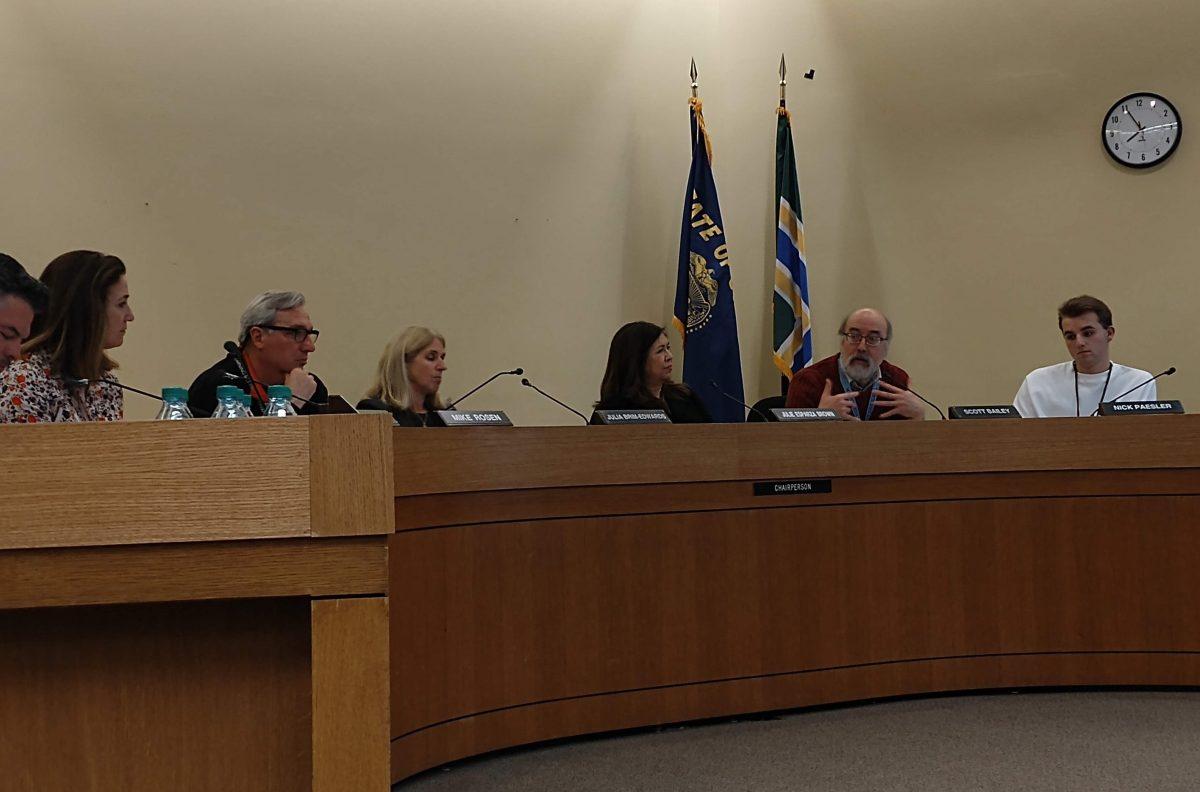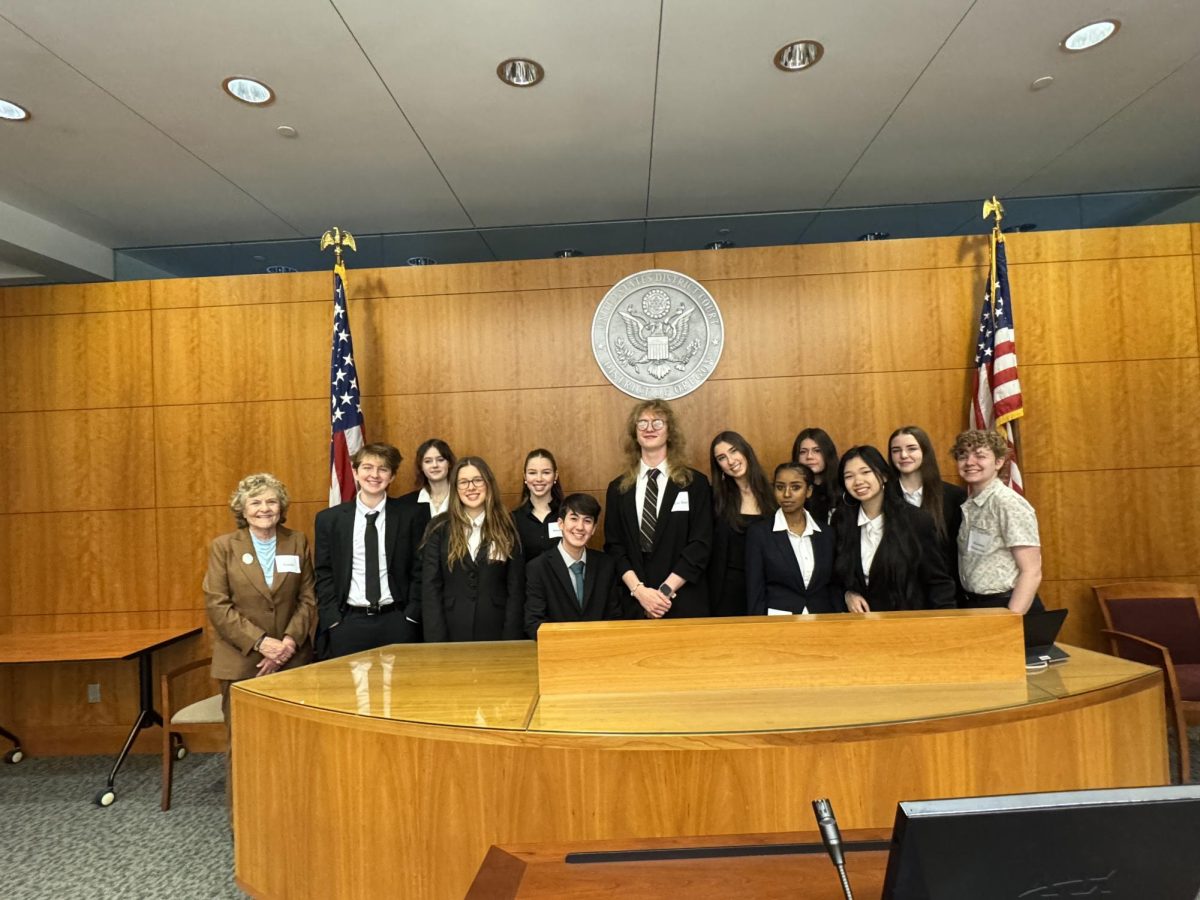
The PPS Board of Education engages in a discussion of issues around the district at their January 29 meeting.
Photo by: Leo Baudhuin
On January 29, the Portland Public Schools (PPS) Board of Education voted unanimously in favor of Resolution No. 5807, suspending the Intergovernmental Agreement (IGA) between PPS and the Portland Police Bureau (PPB) that they had approved on December 11, 2018. The IGA created a formal contract between PPS and PPB, delegating one full-time School Resource Officer (SRO) to each of the nine high school clusters for the cost of $1.2 million every year. As defined in the agreement, an SRO is a sworn law enforcement official who serves to promote public safety, as well as informally filling the roles of a counselor and educator. SROs undergo specialized training in “restorative justice and trauma-enforced practices” to allow them to more effectively work with students with the goal of keeping youth out of the juvenile justice system. Prior to the IGA, SROs worked in PPS schools without a contract or funding from the district.
Proposed by board member Julia Brim-Edwards, Resolution No. 5807 cites a false deadline from the City of Portland, claiming that PPS was under the belief that the IGA had to be “approved no later than December 31, 2018; otherwise [existing SRO] services to PPS and its schools would terminate,” and pointing out that the city has yet to vote on the agreement. At the board meeting on January 29, Brim-Edwards explained her three main reasons for proposing the IGA’s suspension: providing the board with more time to discuss the agreement with students, signaling that the board is reconsidering the cost shift to PPS, and formally removing the current version of the IGA from the table. Specifically, the shift in SRO funding seemed unreasonable to Brim-Edwards, considering PPS’s primary role as an educational entity. “We should devote every last dollar to [educating students],” she said. Many board members echoed Brim-Edwards’ financial concerns. “[The board has] made it clear that PPS is unwilling to use our limited resources to subsidize the police, since public safety is an essential city responsibility,” said vice chair Julie Esparza Brown. Esparza Brown also indicated that she would not endorse any future resolution allowing for SROs, emphasizing her worries about the presence of armed officers in a school environment.
The board also addressed the heavy pushback from students and community members who claimed that student feedback was not properly taken into account regarding the IGA’s approval. “This was a rushed decision that was based on a faulty deadline,” Brim-Edwards said. Others on the school board acknowledged failed student engagement sessions and a lack of publicity around the initial vote as a result of this false timeline. “There shouldn’t be a time when expediency trumps student voice in our decision making,” board member Amy Kohnstamm said.
Students at the board meeting expressed their frustration with the lack of community input on the IGA, with seven students and one teacher speaking during the resolution-specific public comment section of the discussion, and one student offering thoughts during the general public comment session earlier in the meeting. The general stance among those who testified was one critical of the IGA, although Ben Snead, a junior at Grant High School, and Mika Schow, the Grant student who spoke at the beginning of the board meeting, expressed their support. “Just because some people have the louder voices doesn’t mean they’re the only ones with opinions,” Snead said, criticizing the board for changing their vote on the IGA.
Students in favor of the resolution to suspend the agreement referenced the board’s inadequate outreach ahead of the IGA vote, and concerns regarding a lack of comfort and safety—especially from students of color—around armed officers. “[Jefferson students] were able to get more community input in 24 hours than the board was able to get in two months,” said Camila Arze Torres Goitia, a social studies and leadership teacher at Madison High School. She described a conversation about the IGA she had with her students, explaining that “not one of them said an armed police officer would make them feel safe and secure.” Students echoed this sentiment. Roosevelt senior Breely Buttitta, testifying on behalf of herself and two of her classmates, stated that, “cops in schools lead to students being criminalized for behavior that should be handled inside the school,” and emphasized her belief that “students should be educated, not incarcerated.” Buttitta also pointed out the board’s lack of effort in engaging students. “If students come out wholeheartedly against a proposal, it is your duty to hear us out and take our voices into consideration when you make decisions that affect us students more than any other group,” she said. “If you don’t, you are knowingly and willingly betraying the students you claim to stand for.”
The board expressed their desire to actively incorporate student voice before approving another agreement with the PPB. “We want to be very intentional with regards to this process to ensure that students have decision making supports in place for continued conversation,” said Jonathan García, the Senior Director of Strategic Partnerships and External Affairs. García outlined a three-step process for engaging students. First, they plan to reach out to high schools, working with administration to identify student groups that would be interested in creating a dialogue about the presence of SROs and “ensuring students of color have intentional voice.” The board then plans to request two student representatives from each school to have “serious dialogue with staff and with the board to really address [student] concerns.” Finally, they want to engage students district-wide “to ensure all students have access to this information and really have an opportunity to share opinion and thoughts.” García explained that strategies for the last step of this process have yet to be determined.
At Franklin, PPS has scheduled a Student Forum on February 28, from 2:15-3:30pm, tentatively located in the library. Although space may be limited, PPS hopes to provide information and engage in an open dialogue with students about SROs, campus safety, and how best to elevate student voice on these issues. Students are encouraged to reach out to García at [email protected] if they have further questions.

































